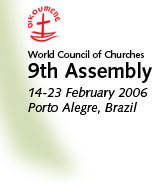 |
WCC > Home > News & media > News | ||||
| About the assembly | Programme | Theme & issues | News & media | |||||
 |
|
||||
|
16.09.05
WCC executive urges churches to exercise "unique potential" for peace
Full text of WCC public statements available, see below
Churches must take responsibility to nurture healing in broken societies and to promote peace, urged leaders of the World Council of Churches (WCC) in public statements on Haiti and small arms released today.
The 25-member WCC executive committee was meeting at the WCC's Bossey Ecumenical Institute, near Geneva, 13-16 September 2005, in its last full meeting prior to the WCC 9th Assembly in 2006.
<span style="font-weight: bold; "» A public voice against gun violence
In a statement on small arms and light weapons, the WCC executive committee urged churches to exercise their "unique potential" to curb demand for guns and "to affirm God's vision of life in peace and fullness" by "changing public attitudes, shaping community values and becoming a public voice against gun violence."
Small arms are used in the vast majority of the estimated 350,000 of the world's deaths by violence annually. In 2006, the WCC will lead an ecumenical delegation at the United Nations Small Arms Review Conference.
<span style="font-weight: bold; "» New social contract for Haiti
Referring to the critical situation in Haiti, the committee acknowledged the "enormous challenges faced by the people and the witness of the churches in the country". It also underlined its "concern for the current unstable political situation", as well as the extreme poverty, violence and human suffering experienced by the population.
The committee asked member churches to express solidarity and to support churches in Haiti to develop a monitoring team during forthcoming elections. Churches are called to "support processes towards genuine popular participation and a new social contract" for the benefit of all, the statement says.
The committee called on the churches in Haiti to "intensify ecumenical initiatives" for justice, peace and reconciliation. The WCC has closely followed developments in Haiti in recent years and has led ecumenical efforts for mediation and healing in the divided society. The WCC general secretary Rev. Dr Samuel Kobia met with church and political authorities in Haiti in August 2005.
<span style="font-weight: bold; "» Hurricane Katrina: the vulnerability of power
In his report to the committee, Kobia commented on the consequences of Hurricane Katrina, which ravaged the southern USA in early September. "The disaster has provoked widespread expressions of compassion and solidarity among churches worldwide," Kobia stated. "It also exposes profound weakneses and wounds in American society, and pertinent questions of racism, poverty and the impact of global warming, that need to be addressed with urgency and determination. The disaster confronts us with the vulnerability of power, and should challenge states to shift policies and reconsider international relationships."
<span style="font-weight: bold; "» WCC programme and Assembly matters
The committee reviewed the Council's programmatic work in 2005, and evaluated major initiatives in the areas of mission and interreligious dialogue. It also welcomed a continued stabilization in the financial situation of the organization. Among key actions agreed by the executive committee:
<span style="font-weight: bold; "» WCC 9th Assembly
The executive committee finalized arrangements for the WCC 9th Assembly, to be held in Porto Alegre, Brazil in February 2006. The committee confirmed nominations made by member churches and reviewed plans for the agenda, leadership and organization of the event, which is expected to gather over 3,000 church and ecumenical representatives from all regions.
Alongside work on themes such as church unity, economic justice and overcoming violence, the committee proposed that the Assembly delegates also focus on international issues, including the responsibility to protect, UN reform, Latin America, and nuclear non-proliferation.
<span style="font-weight: bold; "» Membership
The executive committee recommended that the Lao Evangelical Church, the first from this country, be accepted for membership by the WCC central committee in 2006. Six other applications for membership will also be processed after the Assembly.
The committee supported the application of a series of church agencies and organizations to be recognized by the central committee as "specialized ministries in working relationship with the WCC" under new rules taking effect in 2006.
<span style="font-weight: bold; "» Alliance for development
Plans for a new global ecumenical platform for development, involving the WCC, were affirmed, and greater consultation and information-sharing within the WCC constituency was encouraged.
Concluding the meeting of the executive committee, the general secretary expressed his thanks to the officers and members of the committee, and particularly to the moderator Catholicos Aram I, for his "wise counsel, theological depth and grasp of global issues," which guided the Council over the last seven years.
The full text of the statement on Small Arms and Light Weapons: www.oikoumene.org/Statement.1250.0.html
The full text of the statement on Haiti: www.oikoumene.org/Statement.1251.0.html
|
|||
|
|
|

